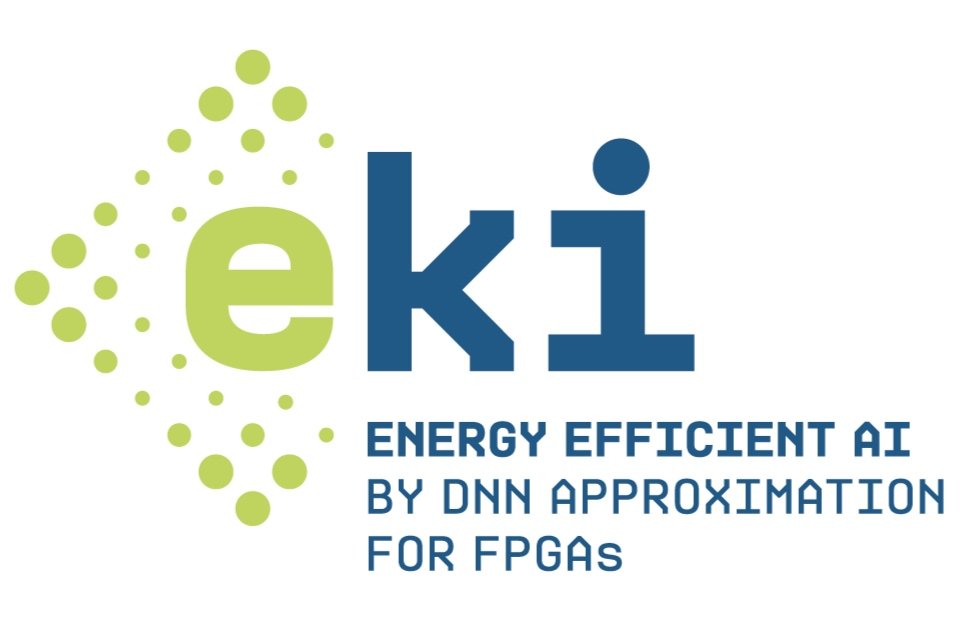Current research projects of the High-Performance Computing group
The High-Performance Computing group has been involved with numerous research projects. Many of our projects are funded by third research funding agencies such as: the Germany Research Foundation (DFG), Germany Ministry for Education and Research (BMBF), the European Commission. An overview of our completed research projects can be found here.
Below is a list of our ongoing research projects.
Energy-Efficient AI in the Data Center by Approximating DNNs for FPGAs

The goal of the eki project is to increase the energy efficiency of AI systems for deep neural network (DNN) inference through approximation techniques and mapping to high-end FPGA systems. DNNs have emerged in recent years as an essential approach to statistical machine learning. In the inference phase, classifications or regressions are computed on typically very large datasets, which already provides a significant computational load and associated CO2 emissions. As the demand for DNN inference will continue to grow strongly, there is a high need for action. FPGAs are a particularly well-suited technology for DNN inference because their hardware reconfigurability allows them to be optimally adapted to the application. In this project, based on the open source tool FINN, a software tooflow is developed that automates, optimizes and hardware-adapts DNNs. The approaches followed are the approximation techniques of network pruning and low precision quantization, as well as parallelization on an FPGA cluster. Subsequently, the achieved energy savings will be characterized by precise measurements in real server systems. Other aspects of the project include the development of an AutoML method for energy optimization and experimental evaluation using test DNNs and two use case studies from the areas of natural language processing and optimization in agriculture.
Funding: German Federal Ministry for the Environment, Nature Conservation, Nuclear Safety and Consumer Protection, 67KI32004A
Runtime: 01/2023 – 12/2025
Website: https://www.eki-project.tech
CoDeO-FPGA – Performance-optimized co-design of ocean modeling software on FPGAs
Modern flooding/weather/climate prediction models critically rely on sophisticated numerical methods and ever increasing spatial and temporal resolution to deliver more accurate and physically comprehensive simulations. Also more detailed physics and more complex numerical schemes better representing subgrid scale effects are certainly high on the agenda. However, running high-resolution models on planet- or even region-sized domains sets a very high bar for the computational and energy efficiency of model codes on modern and future parallel and hybrid architectures. In particular, HPC systems with energy-efficient FPGA accelerators and special data-flow-oriented execution models offer special potential, but also require completely new approaches for the software development of earth system models.With this project, we propose to substantially advance the state of the art by combining several innovative methodologies from computer science, numerical algorithms, and grid generation within a comprehensive software/hardware co-design concept to deliver previously unattainable computational and energy performance levels. The proposed work extensively utilizes the techniques and tools created in the scope of the existing cooperations between Prof. Aizinger and Dr. Grosso and between Dr. Kenter and Prof. Aizinger.The application in the focus of the project is an ocean model that combines a number of key physical, mathematical, and numerical aspects specific to geophysical and climate applications. These include very large, geometrically complex domains which require numerical methods with high accuracy, local conservation of important physical quantities, low numerical diffusion, support of unstructured meshes, and good parallelization properties. The key ingredients of the proposed project are: An FPGA-optimized discontinuous Galerkin (DG) solver based on the UTBEST code, block-structured meshes of unique makeup -- supporting blocks with and without inner structure -- a further development of methodology first introduced in DFG GR 1107/3-1, and a~data flow FPGA design utilizing OpenCL and optimized for such combined block meshes.The developed methodologies and techniques will be implemented in the form of a technology demonstrator (open access) and applied to realistic showcase flooding scenarios on a high resolution mesh. Beyond the concrete demonstrator, a success of this integrative inter-disciplinary work has, in our opinion, a significant methodological added value that can subsequently shape more ambitious projects in this and related areas, while also establishing the institutional foundations for participation in such projects.
Funding: Deutsche Forschungsgemeinschaft (DFG) - Project number 502500606
Runtime: 2022 – 2025
FPGA4XPCS – Efficient Real-Time Computation of Autocorrelation Functions for X-Ray Photon Correlation Spectroscopy using FPGAs
Funding: German Ministry for Education and Research (BMBF)
Runtime: 10/2022 – 09/2025
Additional information: https://ris.uni-paderborn.de/project/491
